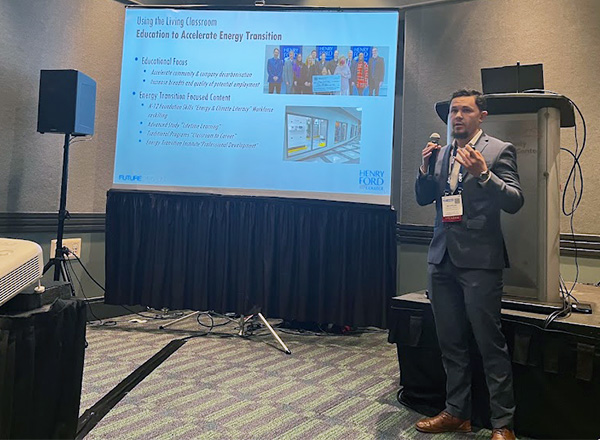IEMP coordinator Nicholas Paseiro shares sustainability goals for community decarbonization at national conference

HFC Integrated Energy Master Plan (IEMP) coordinator Nicholas Paseiro and Johnson Controls Inc. (JCI) performance specialist and energy engineer Amber Buhl served as ambassadors at the AEE World Energy Conference & Expo in Orlando, FL in late October 2023. Former Vice President of the United States and founder of The Climate Reality Project Al Gore was one of the keynote speakers at AEE World.
The IEMP at HFC is a 20-year partnership between the College and JCI to achieve Global Best Practices in Energy Management and Education. These changes promote a sustainable energy culture and a brand-new energy-related curriculum that allows students to learn global best practices in real time from HFC’s own systems. The changes are highly measurable and will result in 60-50-40 gains by the year 2040, including:
- Energy efficiency improvement of at least 60%
- Reduction in greenhouse gas (GHG) emissions of at least 50%
- Water efficiency improvement of at least 40%
Campus energy transformation and living classroom
HFC is at the forefront of colleges and universities in transforming its main campus into a living classroom. Paseiro and Buhl gave a presentation at AEE World called “The Role of Colleges in Accelerating Community Decarbonization.”
“(Paseiro and Buhl) did a masterful job in highlighting the impressive speed with which HFC is transforming its campus into a high-performance ‘living classroom’ as the platform for new educational offerings in the future,” said Peter Garforth, director of Garforth International in Ontario, Canada. “Their presentation also highlighted how HFC leadership’s willingness to embrace the shared prior experiences from Sheridan College and Humber College (two educational institutions in Canada) was a key factor in the speed and cost-effectiveness of the operational transformation and will continue to add value going forward.”
Thousands of communities, cities, colleges, neighborhoods, large property owners, and companies in the U.S., Canada, and beyond have embraced the goal to decarbonize their entire energy use within the next two decades. This goal often goes hand-in-hand with parallel goals to be more resilient to the rapidly changing climate and become more competitive both economically and socially.
70% of GHG emissions come from energy usage in buildings, industry, and transportation
Despite the very visible commitments to these goals at the leadership level and the growing climate imperative, many communities struggle with implementing GHG emissions reduction strategies at the speed and scale required to meet their targets. Recognizing that at least 70% of GHG emissions come from using energy in buildings, industry, and transportation, this should be an immediate focus. The following topics were addressed at AEE World:
- Using evidence-based planning to achieve net-zero GHG emissions and increase resilience in two decades or less.
- Understanding why so few communities and companies are currently on track to implement their plans and meet their decarbonization targets.
- Exploring ways to cost-effectively accelerate implementation, including the need for innovative financing, new decision-making approaches, and reconfigured workforce education.
The impacts of climate change are accelerating, and mitigation and resilience implications can no longer be ignored. There is growing evidence that the necessary measures bring substantial economic and social benefits. Cities, colleges, utilities, and property owners are starting to rise to this challenge, along with creative approaches to support community-scale decision-making.
“I’m proud to be a part of such an impactful project at HFC and grateful to our leadership who were willing to make the investments needed for us to achieve these economic, social, and environmental goals,” said Paseiro.